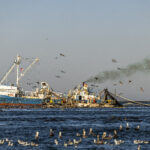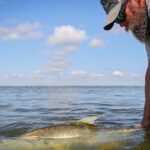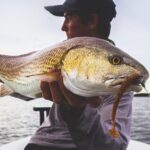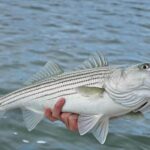
A Gulf Menhaden Deep Dive
Mario CampoFisheries Ecologist, Southeastern Louisiana UniversityScience and Policy Associate, American Saltwater Guides Association This discussion
By Will Poston, Policy Consultant
Last Thursday, February 17, I made the journey down to Tallahassee, FL, to join Captains for Clean Water and a bunch of fishing guides to watch the Florida Senate debate and vote on Senate Bill (SB) 2508. To say the least, it was powerful. I sat with generations of fishing guides from all over the state and all different fishing methods up in the Senate gallery. The gallery was dominated by Costa sunglasses, the accompanying tan lines, and Captains for Clean Water hats. The peanut gallery, if you will, was respectful and offered no outcry or excuse for the Senators to discredit or remove them. It was a textbook public pressure campaign, and it was effective.
Chances are you’ve heard some rumblings about SB 2508 over the past couple of weeks. If you did, you probably heard about it through your favorite tarpon guide, a fishing buddy, or Captains for Clean Water. You also might be wondering why we’re even talking about an issue a thousand of miles away from our core membership; we’re talking about this because within the fight over SB 2508, there are lessons that we can apply to our striped bass/Amendment 7 battle—hopefully finding similar success.
Originally, SB 2508 was a suspiciously filed bill that would have disrupted efforts to restore the Everglades to the benefit of one primary special interest group. For example, the bill originally contained language which would have threatened funding for the highest priority Everglades restoration project, the EAA reservoir. This is an incredibly complex issue—entire books have been written about this decades long fight—so bear with this pared-down summary.
The night before the bill was to receive a vote on the Senate Floor at the Florida Capitol House, an amendment to the bill was filed. Thankfully, this Amendment removed many of the most harmful provisions of SB 2508—and for one reason: a galvanized show of support from 40,000 individuals through an online petition, hundreds of fishing guides and business owners, and overwhelming public pressure.
Almost as soon as the original bill was published, public opposition grew. Conservation groups that follow the Florida legislature and all things Everglades restoration, like Captains and the Everglades Foundation, quickly began mobilizing and organizing opposition to the bill. In just a few days, more than a hundred fishing guides, advocates, and business owners convened at the Florida State House to provide in-person testimony for the Senate hearing on the bill. In response to the overwhelming show of opposition to the bill and passioned testimony of how much these guides rely on abundant fish populations, healthy ecosystems, and clean water, several of the Senators sought to discredit the opposition. “You are misinformed,” they said. They asked fishing guides, who had sacrificed charters and drove hundreds of miles to show how much they care about these issues, technical, legislative questions, “do you know what subsection x of statute y says?” It was insulting and would only embolden Captains for Clean Water and the opposition to SB 2508.
After the hearing, the movement grew. The signatures kept coming, and Florida Governor DeSantis, who ran his election campaign in large part on Everglades restoration, joined too. In just a little more than a week, opposition to SB 2508 had ballooned into an immovable force standing for clean water and South Florida’s estuaries. All these guides and stakeholders have experienced years of harmful discharges, red tides, fish kills, massive seagrass die-offs, you name it—they were not going to allow a backdoor legislative move to threaten years of progress.
The night before the debate and vote, the Senators behind SB 2508 felt the pressure start to boil and filed an amendment that removed the worst of the bill’s provisions —but it did leave some concerning parts in, pertaining to the entity managing South Florida’s water. Make no mistake, all the effort that went in to opposing SB 2508—the social media campaign, all the phone calls, the signatures, the galvanized groundswell of support for clean water—it all worked. This groundswell of support forced these elected officials to throw in the towel and remove the bill’s beneficial provisions for the special interests that do so much harm for Florida’s estuaries.
Even after the amendment and during the Senate’s meeting, you could tell the Senators were on edge. They would sneak glances up to the gallery and then whip back down to their desks. The Senators knew the influence of the peanut gallery and wanted to avoid its ire—it was eye-opening. Ultimately, the amended bill passed by a wide margin, but it was still a great victory for clean water and Everglades restoration.
While SB 2508 was certainly bad policy and process, something else stole the show: the power and effectiveness of a grassroots, organic—whatever you want to call it—group of people who were motivated, educated, and passionate for a cause. That’s exactly what happened down in Tallahassee on Thursday, February 17 and for the week leading up.
This experience really showed me what a grassroots movement of fishy people can accomplish. In just over a week, this group of fishing guides, coastal residents, stakeholders, you name it, was able to substantially influence government and legislation for the benefit of Florida’s estuaries, fisheries, and coastal communities.
That is the lens those who want to see a healthy striped bass stock must approach the Amendment 7 process—and future conservation issues, for that matter. There will be many chances to provide your input and preferences for how striped bass should be managed. So, to maximize your and our collective effectiveness, we must be educated on the issues, passionate about our fishery and communities, and let the Atlantic States Marine Fisheries Commission know that we’re ALL watching. As of late, I think it’s safe to say that the Commission is on the ropes and understands that more missteps with striped bass will lead to oversight and possibly even targeted reform. To wrap this up, stay on the lookout for our Amendment 7 positions—they should be out any day now—and get ready to mobilize and advocate for the conservation and sustainable management of the most important and iconic fish on the Atlantic coast.

Mario CampoFisheries Ecologist, Southeastern Louisiana UniversityScience and Policy Associate, American Saltwater Guides Association This discussion

The Jack Project continues to gather momentum as tagging teams across the Gulf and South

This guide is meant to educate anglers, conservationists, and the public about the Atlantic States

Imagery Courtesy of Sean Cobelli Media We encourage anglers, guides and conservationists to use this
We rely on our members and donations to keep fighting for a sustainable tomorrow in marine conservation.
GIVE THE GIFT OF FISHERIES CONSERVATION THIS HOLIDAY SEASON. SHOP ASGA GOODS THAT FUND FISHERIES RESEARCH & ADVOCACY CAMPAIGNS
JOIN ASGA IN CALLING FOR CRITICAL MANAGEMENT ACTION AFTER YEARS OF SPAWN FAILURES & POOR MANAGEMENT.
By using this website, you agree to our use of cookies. We use cookies to provide you with a great experience and to help our website run effectively. To learn more, please review our privacy policy.
2 Responses
The people own the water not the legislature’s that takes money to give it away to certain groups.
This is a disgrace for Florida to be dictated by a few who have no concern for conservation
Us minnows no how to follow the money that influence our state legislatures. Hold them accountable and need be vote out the bad apples